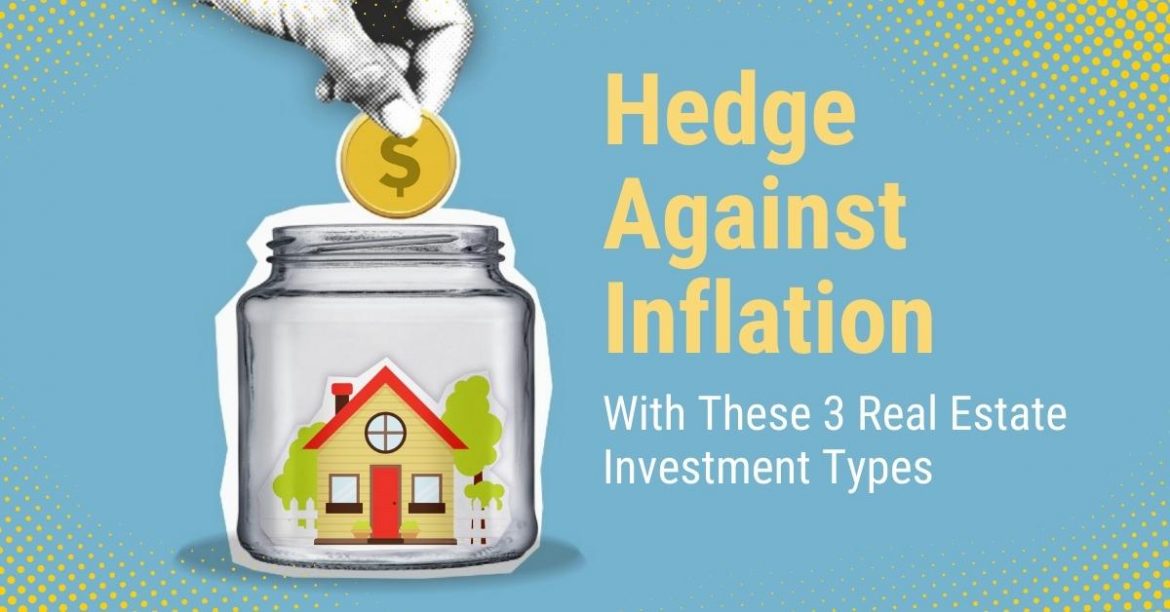
The annual inflation rate in the United States is currently around 7.5%—the highest it has been since 1982.1 It doesn’t matter if you’re a cashier, lawyer, plumber, or retiree; if you spend U.S. dollars, inflation impacts you.
Economists expect the effects of inflation, like a higher cost of goods, to continue.2 Luckily, an investment in real estate can ease some of the financial strain.
Here’s what you need to know about inflation, how it impacts you, and how an investment in real estate can help.
WHAT IS INFLATION AND HOW DOES IT IMPACT ME?
Inflation is a decline in the value of money. When the rate of inflation rises, prices for goods and services go up. Therefore, a dollar buys you a little bit less with every passing day.
The consumer price index, or CPI, is a standard measure of inflation. Based on the latest CPI data, prices increased 7.5% from January 2021 to January 2022.1 A little bit of inflation is considered healthy for the economy, but 7.5% in a single year is high.
How does inflation affect your life? Here are a few of the negative impacts:
● Decreased Purchasing Power
We touched on this already, but as prices rise, your dollar won’t stretch as far as it used to. That means you’ll be able to purchase fewer goods and services with a limited budget.
● Increased Borrowing Costs
In an effort to curb inflation, the Federal Reserve is expected to raise the federal funds rate. Therefore, consumers are likely to pay a higher interest rate on new mortgages, car loans, and variable-rate credit cards.3
● Lower Standard of Living
Wage growth tends to lag behind price increases. According to Moody Analytics, when adjusted for inflation, average weekly earnings in January were down 3.1% from a year earlier.4 As such, life is becoming less affordable for everyone. Inflation can force those on a fixed income, like retirees, to make lifestyle changes and prioritize essentials.
● Eroded Savings
If you store all your savings in a bank account, inflation is even more damaging. As of February 2022, the national average interest rate for a savings account is 0.06%, not nearly enough to keep up with inflation. And economists don’t expect that rate to go much higher.3
One of the best ways to mitigate these effects is to find a place to invest your money other than the bank. Even though interest rates are expected to rise, they’re unlikely to get high enough to beat inflation. If you hoard cash, the value of your money will decrease every year and more rapidly in years with elevated inflation.
REAL ESTATE: A PROVEN HEDGE AGAINST INFLATION
So where is a good place to invest your money to protect (hedge) against the impacts of inflation? There are several investment vehicles that financial advisors traditionally recommend, including:
● Stocks
Some people invest in stocks as their primary inflation hedge. However, the stock market can become volatile during inflationary times, as we’ve seen in recent months.5
● Commodities
Commodities are tangible assets, like oil, livestock, and minerals. The theory is that the price of commodities should climb alongside inflation. But the classic choice–gold–hasn’t risen consistently during periods of inflation since the 1970s, according to data from Morningstar Direct.6
● Inflation-Indexed Bonds
Treasury inflation-protected securities, or TIPS, are U.S. government-issued bonds that are indexed to the inflation rate. Bonds are considered low risk, but the returns they offer are generally low, as well.7
● Real Estate
Real estate prices across the board tend to rise along with inflation and often rise faster than inflation.8 That’s one of the reasons demand for real estate is soaring right now.9
We believe real estate is the best hedge against inflation. Owning real estate does more than protect your wealth—it can actually make you money. For example, home prices rose nearly 17% from 2020 to 2021, 10% ahead of the 7% inflation that occurred in the same timeframe.10
Plus, certain types of real estate investments can help you generate a stream of passive income. In the past year, property owners didn’t just avoid the erosion of purchasing power caused by inflation; they got ahead.
TYPES OF REAL ESTATE INVESTMENTS
Though there are myriad ways to invest in real estate, there are three basic investment types that we recommend for beginner and intermediate investors. Remember that we can help you determine which options are best for your financial goals and budget.
● Primary Residence
If you own your home, you’re already ahead. The advantages of homeownership become even more apparent in inflationary times. As inflation raises prices throughout the economy, the value of your home is likely to go up concurrently. At the same time, you’ve locked in a set mortgage payment for the next 30 years, so you’ll be immune to rising rental costs.
If you don’t already own your primary residence, homeownership is a worthwhile goal to pursue.
Though the task of saving enough for a down payment may seem daunting, there are several strategies that can make homeownership easier to achieve. If you’re not sure how to get started with the home buying process, contact us. Our team can help you find the strategy and property that fits your needs and budget.
Whether you already own a primary residence or are still renting, now is a good time to also start thinking about an investment property. The types of investment properties you’ll buy as a solo investor generally fall into two categories: long-term rentals and short-term rentals.
● Long-Term (Traditional) Rentals
A long-term or traditional rental is a dwelling that’s leased out for an extended period. An example of this is a single-family home where a tenant signs a one-year lease and brings all their own furniture.
Long-term rentals are a form of housing. For most tenants, the rental serves as their primary residence, which means it’s a necessary expense. This unique quality of long-term rentals can help to provide stable returns in uncertain times, especially when we have high inflation.
To invest in a long-term rental, you’ll need to budget for maintenance, repairs, property taxes, and insurance. You’ll also need to have a plan for managing the property. But a well-chosen investment property should pay for itself through rental income, and you’ll benefit from appreciation as the property rises in value.
We can help you find an ideal long-term rental property to suit your budget and investment goals. Reach out to talk about your needs and our local market opportunities.
● Short-Term (Vacation) Rentals
Short-term or vacation rentals function more like hotels in that they offer temporary accommodations. A short-term rental is defined as a residential dwelling that is rented for 30 days or less. The furniture and other amenities are provided by the property owner, and today many short-term rentals are listed on websites like Airbnb and Vrbo.
A short-term rental can potentially earn you a higher return than a long-term rental, but this comes at the cost of daily, hands-on management. With a short-term rental, you’re not just entering the real estate business; you’re entering the hospitality business, too.
Done right, short-term rentals can be both a hedge against inflation and a profitable source of income. As a bonus, when the home isn’t being rented you have an affordable vacation spot for yourself and your family!
Contact us today if you’re interested in exploring options in either the long-term or short-term rental market. Mortgage rates are expected to rise, so you’ll want to act fast to maximize your investment return.
WE’RE INVESTED IN HELPING YOU
Inflation is a fact of life in the U.S. economy. Luckily, you can prepare for inflation with a carefully managed investment portfolio that includes real estate. Owning a primary residence or investing in a short-term or long-term rental will help you both mitigate the effects of inflation and grow your net worth, which makes it a strategic move in our current financial environment.
If you’re ready to invest in real estate to build wealth and protect yourself from rising inflation, contact us. Our team can help you find a primary residence or investment property that meets your financial goals.
The above references an opinion and is for informational purposes only. It is not intended to be financial advice. Consult the appropriate professionals for advice regarding your individual needs.
Sources:
1. Bloomberg –
https://www.bloomberg.com/news/articles/2022-02-10/u-s-inflation-charges-higher-with-larger-than-forecast-gain
2. CNN –
https://www.cnn.com/2022/01/01/economy/inflation-prices-2022-preview/index.html
3. CNBC –
https://www.cnbc.com/2022/01/26/the-fed-sets-the-stage-for-a-rate-hike-heres-what-that-means-for-you.html
4. Reuters –
https://www.reuters.com/business/us-consumer-prices-rise-strongly-january-weekly-jobless-claims-fall-2022-02-10/
5. NBC News –
https://www.nbcnews.com/business/markets/market-slide-dow-falls-700-points-sp-enters-correction-territory-rcna13304
6. CNBC –
https://www.cnbc.com/2021/12/20/gold-is-losing-its-status-as-an-inflation-hedge-two-traders-warn.html
7. Morningstar –
https://www.morningstar.com/articles/1079158/why-are-inflation-protected-bond-funds-losing-money
8. The Washington Post –
https://www.washingtonpost.com/business/2022/01/04/heres-how-inflation-could-affect-your-next-real-estate-move/
9. Bloomberg –
https://www.bloomberg.com/news/articles/2022-01-24/is-real-estate-a-good-investment-hedge-against-inflation-what-the-experts-say
10. CNN –
https://www.cnn.com/2022/01/20/homes/us-nar-home-sales-december-and-2021/index.html




